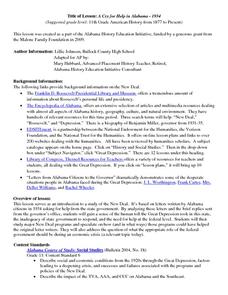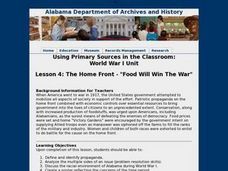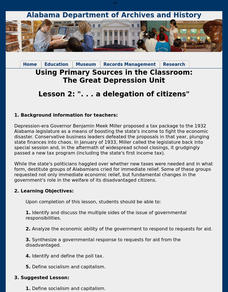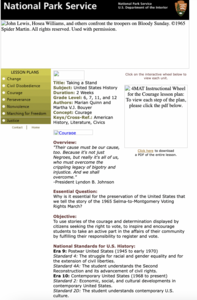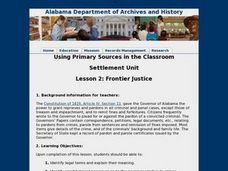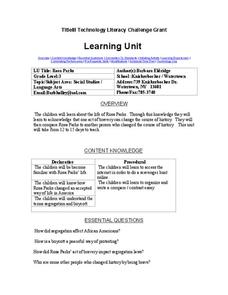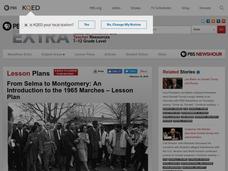Alabama Department of Archives and History
Alabama's 1901 Constitution
"We, the People of the State of Alabama. . ." Did you know that the Alabama State Constitution has 357,157 words while the US Constitution has only 4,400? And that it has 798 amendments while the US Constitution has 27? Class groups...
Alabama Department of Archives and History
A Cry for Help in Alabama - 1934
What should be the role of the federal government during an economic crisis? That is the question at the center of this introduction to a study of the New Deal. Class members examine letters to the state government asking for help,...
Curated OER
Welcome to the Class
Students recognize behaviors that make them better citizens. In this group cooperation lesson, students create a class chart of behaviors when the class cooperates. Students role play situations with new students to identify successful...
Stanford University
Lesson Plan: The Children's Crusade and the Role of Youth in the African American Freedom Struggle
Young people played significant roles in the Civil Rights movement. Class members examine the contributions of Barbara Johns, Claudette Colvin, Mary Louise Smith, and the children of Birmingham,...
Curated OER
The Home Front - "Food Will Win The War"
Students define and identify propaganda. They analyze the multiple sides of an issue (problem resolution skills), then discuss the racial environment of Alabama during World War I. They reate a poster reflecting the concerns of the time...
Curated OER
Lonely Fish
Students read the book The Rainbow Fish. In this citizenship lesson, students discuss how the characters in the story resolved conflicts. Students create a rainbow fish from foil and cotton.
Curated OER
Participating in the Political Process
Students explain why it is important to participate in government, and name at least three ways citizens can participate.
Curated OER
The Role of Government and Citizens
Learners define term representative democracy, explain how the government responds to the needs of its citizens, describe the role of citizens in a representative democracy, and explain how citizens can influence public policy.
Alabama Department of Archives and History
The Wrong Side of History: How One Group Justified Its Opposition on the Freedom Riders and Civil Rights for African Americans
Designed as a supplement to the study of the Freedom Riders, this resource uses primary sources to reveal the views of those who opposed the Freedom Riders. After careful study of the arguments presented by the members of the Montgomery...
Alabama Department of Archives and History
The Great Depression - Hard Times Hit America
To gain an understanding of how the Great Depression affected everyday citizens, class members examine letters written either to the president or to the governor of Alabama asking for assistance.
Teaching for Change
A Documents-Based Lesson on the Voting Rights Act
How did the Voting Rights Act affect the daily lives of American citizens? A document-based lesson developed by the Student Non-Violent Coordinating committee (SNCC) presents a case study of the impact of the Voting Rights Act of 1965 on...
Curated OER
How Ordinary People Can Have an Impact
Students identify three or more ways the Federal Government impacts their daily lives and then explore ways in which citizens can influence political leaders.
Curated OER
Marching For Freedom
Students appreciate the sacrifices that people from across the country made to ensure that all citizens could exercise their constitutional right to vote. They access excellent websites and documents imbedded in this plan to guide their...
Curated OER
Lesson 2: ". . . a delegation of citizens"
Students define socialism, capitalism and poll tax. They identify and discuss the multiple sides of the issue of governmental responsibilities.
Curated OER
Constitution Day: The 1965 Alabama Literacy Test
Tenth graders examine the United States Constitution. In this American Government lesson plan, 10th graders read excerpts from President Johnson's speech to Congress and parts of the Voting Rights Act of 1965. Students research other...
Curated OER
Taking a Stand - 1965 Selma-to-Montgomery Voting Rights March
Young scholars examine the 1965 Selma-to-Montgomery Voting Rights March. They view pictures reflecting their perceptions of their most important rights as citizens, write journal responses, create collages illustrating courage, and read...
Curated OER
Does It Look All Right to Me?
Learners identify different viewpoints in society. They describe the characteristics of some of the individuals involved in the march from Selma to Montgomery, Alabama. They listen to a historical narrative and identify issues of...
Alabama Department of Archives and History
The Civil War at Home
To conclude a study of the 4 C's (cause, course, consequences, and characters) of the Civil War, young historians examine personal letters that reveal the effects of the war on those at home.
Curated OER
Frontier Justice
Students make an investigation into the Constitution of 1819, Article IV, Section II, gave the Governor of Alabama the power to grant reprieves and pardons in all criminal and penal cases, except those of treason and impeachment, and to...
Curated OER
Rosa Parks
Students complete a variety of written and discussion activities regarding Rosa Parks and the Alabama bus boycott and how they changed an accepted way of life in America.
Curated OER
The Relationship between Legislators and Constituents
Students discuss roles of a legislator, explain why some people criticize legislators for not looking out for the interests of their constituents, and identify ways citizens can monitor legislators and hold them accountable.
Curated OER
Let's Celebrate Our Land!
Young scholars investigate Woody Guthrie's beliefs. In this citizenship instructional activity, students research and discuss the beliefs of Woody Guthrie and write down several facts that they learned.
National Endowment for the Humanities
Martin Luther King, Jr. and Nonviolent Resistance
Was nonviolent resistance the best means of securing civil rights for black Americans in the 1960s? For this highly engaging and informative lesson, your young historians will closely analyze several key documents from the civil rights...
PBS
From Selma to Montgomery: An Introduction to the 1965 Marches
The 1965 Civil Rights marches from Selma to Montgomery and the resulting Voting Rights Act of 1965 are the focus of a social studies lesson. The resource uses film clips to inform viewers not only about the discrimination that gave rise...



